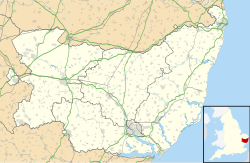| Elveden | |
|---|---|
 St Andrew and St Patrick Church, Elveden | |
Location within Suffolk | |
| Population | 270 (2005) [1] 254 (2011) [2] |
| District | |
| Shire county | |
| Region | |
| Country | England |
| Sovereign state | United Kingdom |
| Post town | Thetford |
| Postcode district | IP24 |
| Dialling code | 01842 |
| Police | Suffolk |
| Fire | Suffolk |
| Ambulance | East of England |
| UK Parliament | |

Elveden is a village and civil parish in the West Suffolk district of Suffolk in eastern England. In 2005 it had a population of 270. [1] The village is bypassed by the A11 between Cambridge and Norwich, which ran through the centre of the village prior to 2014.

